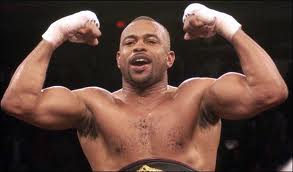
Roy Jones Jr.
*Roy Jones Jr. was born on this date in 1969. He is a Black professional boxer, trainer, and commentator.
Jones was raised in Pensacola, Florida, and started boxing at ten. He won the 1984 United States National Junior Olympics, the 1986 United States National Golden Gloves, and the 1987 United States National Golden Gloves. He ended his career as an amateur with a 121-13 record. Jones represented the United States at the 1988 Seoul Olympic Games, winning the silver medal.
He dominated his opponents, never losing a single round en route to the final. His participation in the final was controversial when he lost a 3-2 decision to South Korean fighter Park Si-Hun despite pummeling Park for three rounds, landing 86 punches to Park's 32. Park apologized to Jones afterward, and the referee told Jones that he was stunned by the judge's decision.
One judge shortly thereafter admitted the decision was a mistake, and all three judges voting against Jones were eventually suspended. An official IOC investigation concluding in 1997 found that South Korean officials influenced three judges. This led to calls for Jones to be awarded a gold medal, but the IOC still officially stood by the decision despite the allegations. Jones was awarded the Val Barker trophy as the best stylistic boxer of the 1988 games, which was only the third and, to this day, the last time in the competition's history when the award did not go to one of the gold medal winners. The incident led Olympic organizers to establish a new scoring system for Olympic boxing.
Jones began as a professional on May 6, 1989, knocking out Ricky Randall. Jones built a record of 15-0 with 15 knockouts before stepping up in class to meet former world welterweight champion Jorge Vaca on January 10, 1992. He knocked Vaca out in round one to reach 16 knockout wins. On November 18, 1994, he was set to face undefeated IBF super middleweight champion James Toney, the #1 ranked "pound for pound" contender. Toney had gone undefeated in 46 bouts and was rated the best in the world.
Jones scored a flash knockdown in the third round. Ring magazine called Jones' performance the most dominant of any big fight in 20 years. In 1995, Jones successfully defended his super middleweight title multiple times. In 1997, Jones had his first professional loss, a disqualification against Montell Griffin. Jones sought an immediate rematch and regained the world light heavyweight title, knocking Griffin down within the first 2 minutes 31 seconds of the fight.
In 1998, Jones began by knocking out former light heavyweight and future cruiserweight champion Virgil Hill. He followed that with a win against the WBA light heavyweight champion, Lou Del Valle, by a decision in 12 on July 18 to unify the WBC and WBA belts. Jones began 1999 by knocking out the WBC number one ranked contender at the time, Rick Frazier. On June 5 that year, he beat the IBF's world champion, Reggie Johnson, to add that belt to the WBC and WBA belts he already owned in the division. 2000 began with Jones beating David Telesco to retain the light heavyweight world championship.
2001, Jones released Round One: The Album, a rap CD. That year, he retained the title against Derrick Harmon and Julio César González. In 2002, Jones retained his title by knocking out Glen Kelly. Jones then defeated Clinton Woods by technical knockout. On March 1, 2003, Roy Jones defeated John Ruiz for the WBA heavyweight title. Jones officially weighed in at 193 lb and Ruiz at 226 lb. Jones became the first former middleweight titleholder to win a heavyweight title in 106 years. Jones also became the first fighter to start his career as a junior middleweight and win a heavyweight title.
On November 8, 2003, Jones returned to the light heavyweight division to fully duplicate Bob Fitzsimmons' feat from 1896. He regained the light heavyweight championship belt by beating Antonio Tarver. By doing this, he became the second boxer in history to win a heavyweight title and regain the light heavyweight title. Jones won by majority decision. On May 15, 2004, Jones faced Tarver in a rematch. Tarver knocked him down at 1:41 of the second round. Jones got on his feet by the count but, for the first time in his career, was ruled unable to continue by the referee.
On September 25, 2004, Glen Johnson knocked out Jones 49 seconds into the ninth round. Jones unanimously defeated Prince Badi Ajamu on July 29, 2006, winning the NABO light heavyweight title. Next up for Jones was the undefeated Anthony Hanshaw on July 14, 2007. Jones won the bout by unanimous decision and the IBC light heavyweight title. On January 19, 2008, Jones beat Félix Trinidad. This was the first time a former heavyweight champion returned to fight successfully at 170 lbs.
Roy Jones Jr lost to Joe Calzaghe on September 20, 2008. Jones defeated Omar Sheika on March 21, 2009. On August 15, 2009, Jones beat Jeff Lacy in 10 rounds. In December 2009, Danny Green defeated Jones in a first-round TKO. On April 3, 2010, Bernard Hopkins was awarded a unanimous decision over Jones, and on May 21, 2011, Denis Lebedev stopped Roy Jones Jr. with 10 seconds remaining in the 10th and final round.